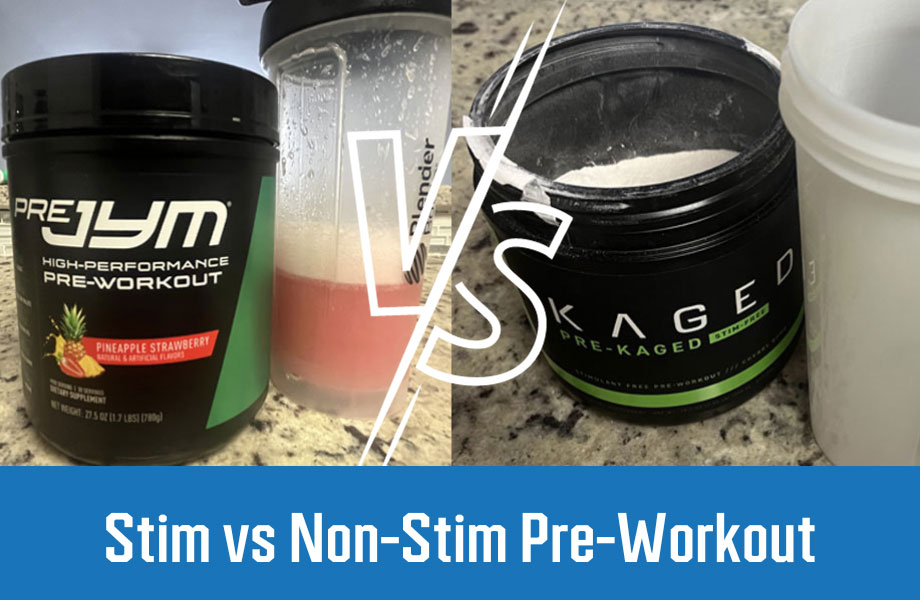We test and review fitness products based on an independent, multi-point methodology. If you use our links to purchase something, we may earn a commission. Read our disclosures.
Making real progress toward your health and fitness goals requires consistency, dedication, and hard work. Knowing this, many people take pre-workouts to maximize their effort during workouts, get a better pump, and see faster results in the gym.
RELATED: Best Pre-Workout
There are two primary types of pre-workout supplements available: those that contain stimulants and those that don’t. Is one better than the other? If you’re wondering what to look for in a pre-workout and find yourself scratching your head when comparing stim vs. non-stim pre-workout supplements, you’re not alone!
As a registered and licensed dietitian, I’m here to help you make an informed decision. Keep reading to learn more about these two types of pre-workout products and which may work best for your training needs.
Medical disclaimer: This article is intended for educational and informational purposes only. It is not intended as a substitute for medical advice. For health advice, contact a licensed healthcare provider.
Stim vs Non Stim Pre Workout: What’s the Difference?
The main difference between stim and non-stim pre-workouts is that stim supplements contain caffeine and possibly other central nervous system (CNS) stimulants, while non-stim supplements do not. Non-stim pre-workouts also contain ingredients to potentially boost your energy and help you work out harder, but these aren’t considered stimulants.
As defined by the FDA1, a stimulant is “a drug which helps restore mental alertness or wakefulness during fatigue or drowsiness”. Stim and non-stim pre-workouts both aim to improve performance during a workout, but non-stim ingredients won’t necessarily help you feel more awake.
Benefits of Stim Pre-Workouts
Stimulant-based pre-workout supplements almost always contain caffeine as their stimulant of choice since it’s known to be safe and effective when taken within recommended guidelines2.
Caffeine works by blocking a compound called adenosine from attaching to adenosine receptors3 in the brain. Adenosine is a neurotransmitter that causes feelings of calmness and drowsiness. By blocking the effects of adenosine, caffeine helps you feel more alert and reduces fatigue.
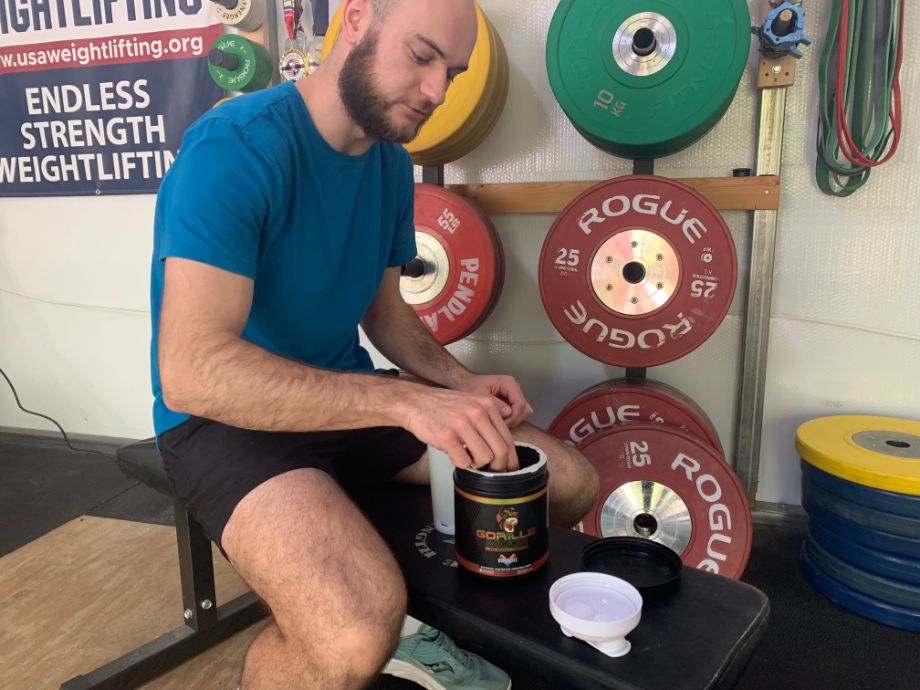
It can also help improve exercise performance when taken before a workout. Stim pre-workouts often contain other ergogenic (exercise-improving) ingredients besides caffeine, so it can be difficult to tell whether it’s the caffeine or other ingredients providing the bigger boost.
The potential benefits of stim pre-workouts include:
- The perception of having more energy
- Increased repetitions to fatigue4 during strength training sets
- Potential for improved aerobic endurance5
- Small to moderate benefits in muscular endurance and strength5, movement velocity, sprinting, jumping, and throwing
- Potential for improved reaction time
- Potential for increased force production during static squats6
- Potential for increased training volume7 leading to muscle growth and fat loss
Keep in mind that these benefits will only be seen if your pre-workout contains enough caffeine to be effective. According to the International Society for Sports Medicine8, it takes anywhere from a dose of 2 to 6 milligrams of caffeine per kilogram of body weight to improve athletic performance.
For a 150 pound person, this ranges from 136 to 406 milligrams of caffeine, which falls well within the FDA-recommended limit for healthy adults of consuming no more than 400 milligrams of caffeine per day.
If a stim pre-workout also contains other ergogenic ingredients, its potential benefits will depend on the amount included in the product. We’ll discuss these other ingredients in more detail in the following section.
RELATED: Best Pre-Workout for Muscle Gain
Benefits of Non-Stim Pre-Workouts
A stim-free pre-workout can also be helpful for improving exercise performance, no caffeine required. You probably won’t feel as wide-awake as you would with a jolt of caffeine, but these products can help in other ways.
In general, non-stim pre-workout supplements may provide the following benefits:
- Potential for increased force production during static squats
- Potential for increased training volume and lean muscle mass gains
- Potential for increased blood flow—via nitric oxide (NO) boosting ingredients like citrulline and arginine—and nutrient delivery to to working muscles
- Potential for improved aerobic and muscular endurance
- Less risk of feeling jittery
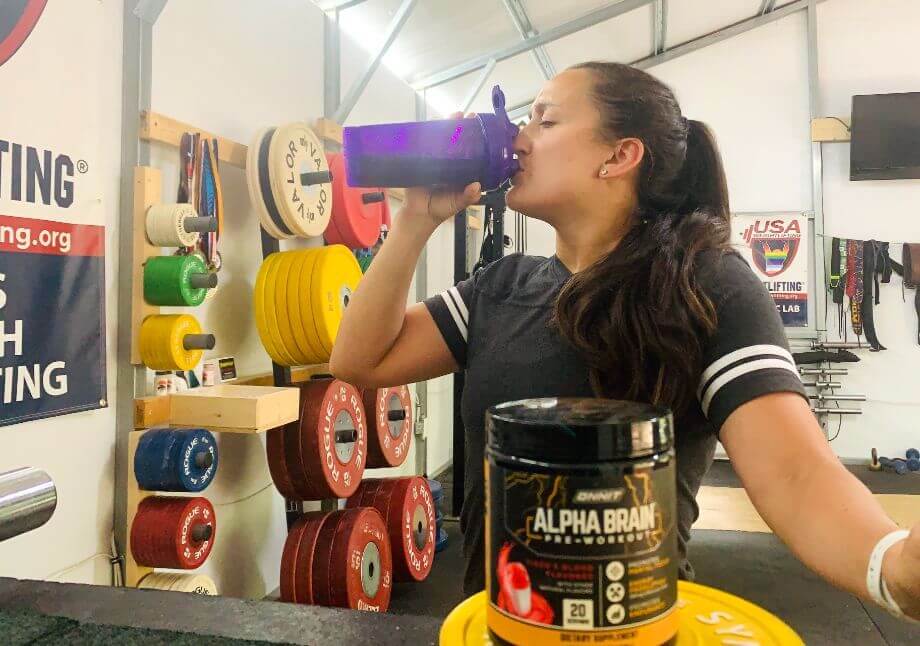
Of course, the benefits seen with non-stim supplements will depend on which ergogenic ingredients are included. These can vary significantly between brands. Some of the most common non-stim ingredients and their effects include:
- Creatine monohydrate: Helps increase muscle stores of creatine phosphate, which helps the body regenerate energy9 more quickly during high-intensity exercises
- Branched-chain amino acids (BCAAs): Three essential amino acids (leucine, isoleucine, and valine) that help build muscle and may or may not speed up muscle recovery and muscle soreness10
- Beta-alanine: May help improve high-intensity exercise performance11 as a precursor to carnosine, an intramuscular buffer
- Nitric oxide agents: Various compounds like L-citrulline and L-arginine that assist in the production of nitric oxide, which helps increase blood flow to the muscles12
- B vitamins: May help improve energy13
- Taurine: May help boost fat burn and reduce muscle damage14
- Betaine: May help with the body’s synthesis of creatine and assists with hydration regulation15
- L-carnitine: May help improve endurance performance, increase blood flow to muscles, and reduce blood lactate levels16
As with stim pre-workouts, potential benefits will depend on the amount of each ingredient included in the product. For example, research has shown17 that taking 4 to 6 grams of beta-alanine a day is effective for providing ergogenic benefits, so a product that contains less than this may not be very helpful.
Often, supplements that claim to provide a better “pump” contain much smaller dosages of nitric oxide agents than were actually used in research studies. This is usually the case with betaine as well.
RELATED: Best Pump Pre-Workout
Risks of Stim and Non-Stim Pre-Workouts
Pre-workouts are classified as dietary supplements, which aren’t well-regulated by the FDA in the United States and may provide less-reputable supplement brands the ability to include contaminants like heavy metals, stimulants, or even banned ingredients.
Some of these ingredients are included unintentionally, but some are included to further boost perceived energy levels and muscle-building potential. Many products contain a “proprietary blend” of ingredients that don’t have to be included on the label, so you may not know what (or the amount) you’re really getting.
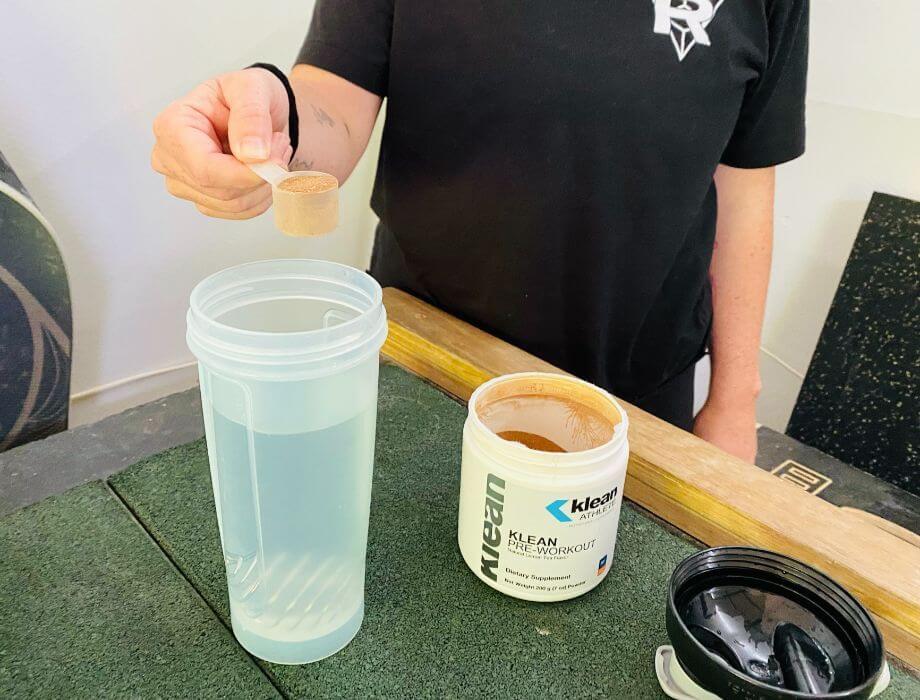
The possibility of dangerous contaminants isn’t conjecture—incredibly, up to 15% of nutritional supplements tested in one study18 contained hormones or prohormones. Illegal compounds like methamphetamine have been found as well, although this is pretty rare.
Another risk is the lack of long-term safety testing with pre-workouts. A 2018 review published in the International Journal of Sports Medicine6 found that multi-ingredient pre-workouts are safe when taken for less than eight weeks, but their safety over months or years is less clear.
So, should we avoid pre-workouts? Not necessarily. Choosing supplements from reputable brands that are third-party tested for purity is helpful, as are products that are NSF-Certified for Sport. These are trustworthy certifications with high standards for sports nutrition supplements.
RELATED: Pre-Workout Side Effects
Who Should Take Stim Pre-Workouts?
The question of whether or not to take stim pre-workouts centers largely on how caffeine affects you as an individual and whether or not it helps you in the gym. Stim pre-workouts can be helpful if:
- You feel more energized or focused during workouts after ingesting caffeine
- You exercise early in the morning and need caffeine for an effective workout
- You metabolize caffeine quickly and can consume it in the afternoon without leading to sleep problems
RELATED: Best Natural Pre-Workout
Who Should Take Non-Stim Pre-Workouts?
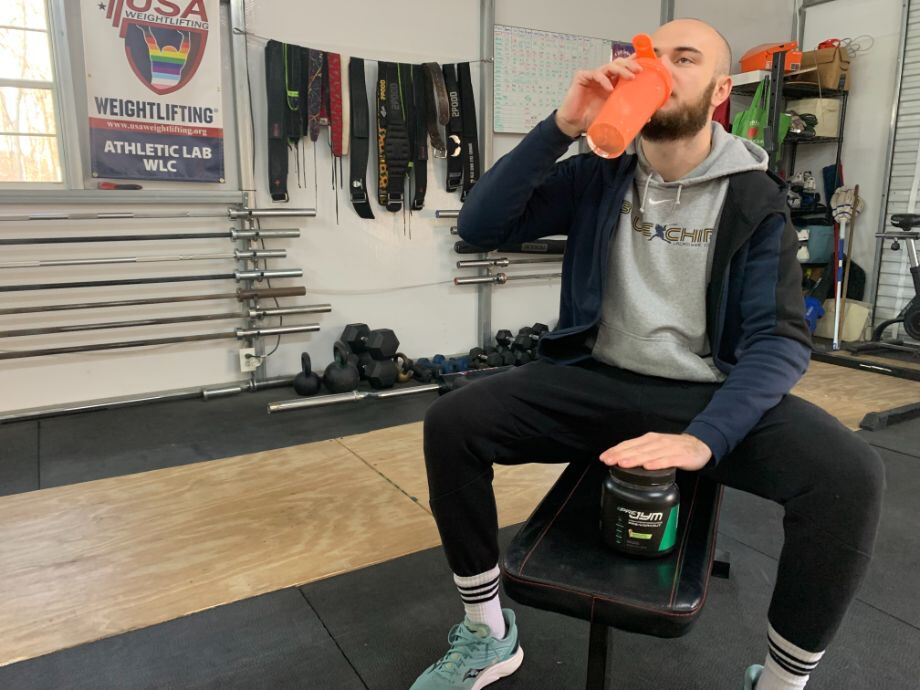
If you’ve noticed that you don’t respond well to caffeine, it’s probably best to avoid pre-workouts that contain that (or other) stimulants. Consider stimulant-free pre-workouts if you:
- Have a heart condition like high blood pressure or atrial fibrillation
- Experience an overly elevated heart rate with caffeine
- Have been advised by your physician to avoid caffeine
- Metabolize caffeine slowly
- Are pregnant or breastfeeding19
- Get the jitters when taking stim pre-workouts
- Have worsened anxiety when consuming caffeine
- Exercise close to bedtime
- Drink regular coffee throughout the day
- Exercise right after eating a meal
- Take medications that interact with caffeine20 (e.g., ephedrine, MAOIs, beta-adrenergic agonists, phenobarbital, diuretic drugs, cimetidine)
Pregnant and breastfeeding women should limit their intake to less than 200 milligrams of caffeine21 a day and need to be particularly careful not to consume too much from beverages and supplements.
Additionally, if you typically exercise soon after a meal, you’ll end up needing to take a pre-workout right after or with that meal. This can be an issue for proper digestion and absorption of certain nutrients since caffeine interferes with the absorption of iron and calcium22.
Stim vs Non Stim Pre Workout: Final Thoughts
As their names suggest, the main difference between stim and non-stim pre-workout supplements is that stim pre-workouts contain nervous system stimulants (most often caffeine), while non-stim pre-workouts don’t.
Both types of supplements often contain other ingredients that have studies to back up their efficiency in the gym, such as creatine (the most extensively studied ergogenic aid23), BCAAs, B-vitamins, and nitric oxide agents. These can still be effective for improving exercise performance, but you may not feel the same energy boost and wakefulness that caffeine provides.
When deciding which supplement is best for you, consider the following:
- How sensitive you are to caffeine
- The time of day you like to work out
- Whether caffeine interacts with any of your medications
- FDA recommendations: healthy adults should have no more than 400 milligrams of caffeine per day24 to avoid negative side effects
- Pregnant and breastfeeding women should limit their caffeine intake to less than 200 milligrams per day24
- Choosing third-party tested or NSF-Certified for Sport supplements may help you avoid dangerous ingredients and contaminants in pre-workouts
If you’re still not sure whether pre-workout supplements are right for you, check out our list of pre-workout alternatives.
Stim vs Non Stim Pre Workout: FAQs
Is stimulant or non stimulant pre-workout better?
Stimulant pre-workouts often contain caffeine, meaning they’ll help you feel more energized and awake before you exercise. Non-stimulant pre-workouts won’t do this, but they’ll contain other ingredients that can help you put more effort into your workouts.
If you need a boost of energy before a workout, stim pre-workouts may be more helpful for you. If you’re sensitive to caffeine, work out in the evening, or have been advised to avoid caffeine by a physician, non-stim pre-workouts are likely a better choice.
RELATED: The 8 Strongest Pre-Workouts
Is it safe to take non stim pre-workout everyday?
It’s safe to take non-stim pre-workout every day as long as the product contains safe levels of each ingredient and isn’t contaminated with heavy metals, dangerous stimulants, or drugs. Choosing an NSF-Certified for Sport supplement is the best way to ensure the safety of your pre-workout.
Can stim free pre-workout keep you awake?
Stim-free pre-workouts shouldn’t keep you awake since they don’t contain stimulants that excite the nervous system. Vigorous workouts close to bedtime may keep some people from falling asleep quickly to do the adrenaline rush, however. If you’re having trouble falling asleep, it may be because you’re working out too close to bedtime.
These statements have not been evaluated by the Food and Drug Administration. This product is not intended to diagnose, treat, cure, or prevent any diseases.
References
- US Food and Drug Administration. 21CFR340 Stimulant drug products for over the counter human use. Accessed 9/22/23.
- Temple JL, Bernard C, Lipshultz SE, Czachor JD, Westphal JA, Mestre MA. The Safety of Ingested Caffeine: A Comprehensive Review. Front Psychiatry. 2017 May 26;8:80. doi: 10.3389/fpsyt.2017.00080. PMID: 28603504; PMCID: PMC5445139.
- Daly JW, Shi D, Nikodijevic O, Jacobson KA. The role of adenosine receptors in the central action of caffeine. Pharmacopsychoecologia. 1994;7(2):201-213. PMID: 25821357; PMCID: PMC4373791.
- Lane MT, Byrd MT, Bell Z, Hurley T. Effects of Supplementation of a Pre-workout on Power Maintenance in Lower Body and Upper Body Tasks in Women. J Funct Morphol Kinesiol. 2019 Apr 5;4(2):18. doi: 10.3390/jfmk4020018. PMID: 33467333; PMCID: PMC7739433.
- Martinez N, Campbell B, Franek M, Buchanan L, Colquhoun R. The effect of acute pre-workout supplementation on power and strength performance. J Int Soc Sports Nutr. 2016 Jul 16;13:29. doi: 10.1186/s12970-016-0138-7. PMID: 27429596; PMCID: PMC4947244.
- Harty PS, Zabriskie HA, Erickson JL, Molling PE, Kerksick CM, Jagim AR. Multi-ingredient pre-workout supplements, safety implications, and performance outcomes: a brief review. J Int Soc Sports Nutr. 2018;15(1):41. Published 2018 Aug 8. doi:10.1186/s12970-018-0247-6
- Mangine GT, Hoffman JR, Gonzalez AM, Townsend JR, Wells AJ, Jajtner AR, Beyer KS, Boone CH, Miramonti AA, Wang R, LaMonica MB, Fukuda DH, Ratamess NA, Stout JR. The effect of training volume and intensity on improvements in muscular strength and size in resistance-trained men. Physiol Rep. 2015 Aug;3(8):e12472. doi: 10.14814/phy2.12472. PMID: 26272733; PMCID: PMC4562558.
- Guest NS, VanDusseldorp TA, Nelson MT, et al. International society of sports nutrition position stand: caffeine and exercise performance. J Int Soc Sports Nutr. 2021;18(1):1. Published 2021 Jan 2. doi:10.1186/s12970-020-00383-4
- Cooper R, Naclerio F, Allgrove J, Jimenez A. Creatine supplementation with specific view to exercise/sports performance: an update. J Int Soc Sports Nutr. 2012 Jul 20;9(1):33. doi: 10.1186/1550-2783-9-33. PMID: 22817979; PMCID: PMC3407788.
- Martinho DV, Nobari H, Faria A, Field A, Duarte D, Sarmento H. Oral Branched-Chain Amino Acids Supplementation in Athletes: A Systematic Review. Nutrients. 2022 Sep 27;14(19):4002. doi: 10.3390/nu14194002. PMID: 36235655; PMCID: PMC9571679.
- Hobson RM, Saunders B, Ball G, Harris RC, Sale C. Effects of β-alanine supplementation on exercise performance: a meta-analysis. Amino Acids. 2012 Jul;43(1):25-37. doi: 10.1007/s00726-011-1200-z. Epub 2012 Jan 24. PMID: 22270875; PMCID: PMC3374095.
- Kiani AK, Bonetti G, Medori MC, Caruso P, Manganotti P, Fioretti F, Nodari S, Connelly ST, Bertelli M. Dietary supplements for improving nitric-oxide synthesis. J Prev Med Hyg. 2022 Oct 17;63(2 Suppl 3):E239-E245. doi: 10.15167/2421-4248/jpmh2022.63.2S3.2766. PMID: 36479475; PMCID: PMC9710401.
- Tardy AL, Pouteau E, Marquez D, Yilmaz C, Scholey A. Vitamins and Minerals for Energy, Fatigue and Cognition: A Narrative Review of the Biochemical and Clinical Evidence. Nutrients. 2020 Jan 16;12(1):228. doi: 10.3390/nu12010228. PMID: 31963141; PMCID: PMC7019700.
- Kurtz JA, VanDusseldorp TA, Doyle JA, Otis JS. Taurine in sports and exercise. J Int Soc Sports Nutr. 2021 May 26;18(1):39. doi: 10.1186/s12970-021-00438-0. PMID: 34039357; PMCID: PMC8152067.
- Cholewa, J.M., Hudson, A., Cicholski, T. et al. The effects of chronic betaine supplementation on body composition and performance in collegiate females: a double-blind, randomized, placebo controlled trial. J Int Soc Sports Nutr 15, 37 (2018). https://doi.org/10.1186/s12970-018-0243-x
- Mielgo-Ayuso J, Pietrantonio L, Viribay A, Calleja-González J, González-Bernal J, Fernández-Lázaro D. Effect of Acute and Chronic Oral l-Carnitine Supplementation on Exercise Performance Based on the Exercise Intensity: A Systematic Review. Nutrients. 2021 Dec 3;13(12):4359. doi: 10.3390/nu13124359. PMID: 34959912; PMCID: PMC8704793.
- Trexler ET, Smith-Ryan AE, Stout JR, Hoffman JR, Wilborn CD, Sale C, Kreider RB, Jäger R, Earnest CP, Bannock L, Campbell B, Kalman D, Ziegenfuss TN, Antonio J. International society of sports nutrition position stand: Beta-Alanine. J Int Soc Sports Nutr. 2015 Jul 15;12:30. doi: 10.1186/s12970-015-0090-y. PMID: 26175657; PMCID: PMC4501114.
- Geyer H, Parr MK, Koehler K, Mareck U, Schänzer W, Thevis M. Nutritional supplements cross-contaminated and faked with doping substances. J Mass Spectrom. 2008 Jul;43(7):892-902. doi: 10.1002/jms.1452. PMID: 18563865.
- Jingjing, Q., Chen, Q., Ward, S. M., Duan, E., & Zhang, Y. (2019, December 6). Impacts of caffeine during pregnancy. Trends in endocrinology & metabolism. Cell.com. https://www.cell.com/trends/endocrinology-metabolism/fulltext/S1043-2760(19)30226-7
- WebMD. Caffeine – uses, side effects, and more. Accessed 9/22/23.
- American Pregnancy Association. Caffeine intake during pregnancy. Accessed 9/22/23.
- Lee J. Association between Coffee and Green Tea Consumption and Iron Deficiency Anemia in Korea. Korean J Fam Med. 2023 Mar;44(2):69-70. doi: 10.4082/kjfm.44.2E. Epub 2023 Mar 20. PMID: 36966735; PMCID: PMC10040266.
- Buford TW, Kreider RB, Stout JR, Greenwood M, Campbell B, Spano M, Ziegenfuss T, Lopez H, Landis J, Antonio J. International Society of Sports Nutrition position stand: creatine supplementation and exercise. J Int Soc Sports Nutr. 2007 Aug 30;4:6. doi: 10.1186/1550-2783-4-6. PMID: 17908288; PMCID: PMC2048496.
- Temple JL, Bernard C, Lipshultz SE, Czachor JD, Westphal JA, Mestre MA. The Safety of Ingested Caffeine: A Comprehensive Review. Front Psychiatry. 2017 May 26;8:80. doi: 10.3389/fpsyt.2017.00080. PMID: 28603504; PMCID: PMC5445139.
Further reading

We tested and ranked the best Whole30 meal delivery services available on the market. Find out what our testers said. Read more

Statistics about obesity rates in America and the world broken up by age and gender. Read more

The REP ISO Armsare an adjustable jammer arm squat rack attachment focused on high functionality at a lower price than competitors. After using them for the past four months, we feel they offer the best value for home gym owners with a power rack, which is the typical value proposition for REP Fitness. We do recommend them, but feel the adjustment feature could be improved. Read more

Making real progress toward your health and fitness goals requires consistency, dedication, and hard work. Knowing this, many people take pre-workouts to maximize their effort during workouts, get a better pump, and see faster results in the gym.RELATED: Best Pre-WorkoutThere are two primary types of pre-workout supplements available: those that contain stimulants and those that don’t. Is one better than the other? If you’re wondering what to look for in a pre-workout and find yourself scratching your head when comparing stim vs. » Read more about: Stim Vs Non Stim Pre Workout: Which One Should You Take? » Read more

